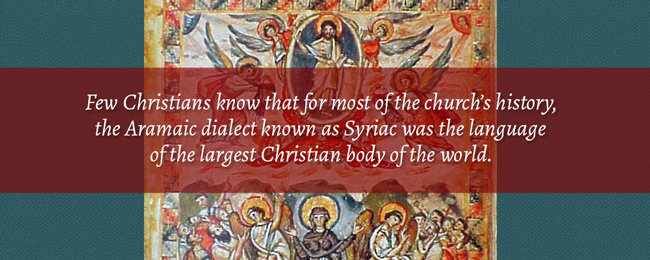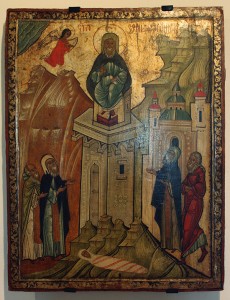
By the end of the first millennium C.E., the Syriac Church far outstripped the Roman Church.
Most Christians know that Jesus’ native tongue was Aramaic, a Semitic language related to Hebrew. But few know that for most of the church’s history, the Aramaic dialect known as Syriac was the language of the largest Christian body of the world. By the end of the first millennium C.E., the Syriac Church far outstripped the Roman Church. Known as the “third lung” of the early church (Greek and Latin being the first two), Syriac Christianity spread via missionary efforts from the Holy Land, through Syria and Lebanon, to northern Mesopotamia and the Sasanian Persian Empire, and eventually to Central Asia, China and south India. The advent of Islam, the Mongol invasion, the Black Death, and various other social and religious factors isolated and reduced the numbers of Syriac-speaking churches over time, but they still flourish today.
A Protestant minister seldom runs across this side of Christianity unless reading Thomas Merton. When my wife Molly and I were in seminary, we became big fans of Merton’s writings, devouring everything we could get our hands upon. Merton’s slim volume, The Wisdom of the Fathers, a selection of pithy anecdotes and sayings of the fourth-fifth century desert fathers in Egypt, captured my imagination. One of the languages the desert fathers’ stories were translated into was Syriac, and a course in Syriac was being offered at the seminary, so I took it. Syriac has since taken me for a long ride.

An icon of Simeon Stylites from the Historic Museum in Sanok, Poland
The Syriac tradition is renowned for its vast and distinctive literature and its rigorous and eccentric asceticism. Simeon Stylites (d. 457), who was perched atop a high pillar for forty years, is the most famous of Syriac ascetics. There were many others who prayed and fasted in deserts and caves, or who grazed and lived like animals in the wilderness.
Very early the Bible was translated into Syriac from Hebrew and Greek and is known as the Peshitta or “simple version.” Biblical commentaries and metrical homilies, historical chronicles, philosophical, medical and scientific writings, works on prayer and spirituality, doctrinal controversies, saints’ tales and guides to the monastic and ascetical life, fill volumes of untranslated Syriac manuscripts.
Consisting of 30 discourses on the pre-monastic spiritual life, the Book of Steps is distinguished by the intentional anonymity of its author.
As a graduate student in the Semitics Department of The Catholic University of America, I encountered scores of Syriac texts. The one I stayed with was the Liber Graduum or the Book of Steps. Consisting of 30 discourses on the pre-monastic spiritual life, the Book of Steps is distinguished by the intentional anonymity of its author. A sole geographic reference points to the Lesser Zab River in northeast Iraq, but other than biblical characters no names are mentioned, nor are any historical events referenced. The anonymous author’s attention focuses upon two groups of committed Christians living in the midst of a hostile Persian empire: the “Upright” who are married and labor, using their incomes to exercise the basics of charity to the needful in their community; and the “Perfect” who are celibate, do not work or own anything, pray unceasingly, and mediate conflicts. No one has ever identified the community or town in which these groups existed. Intriguingly, the author appears to conclude that the Perfect are far from perfect and the Upright are almost, but not quite perfect.
After publishing the first modern language translation of the Book of Steps, I compiled a small volume of selected readings and pastoral reflections on each of the 30 discourses, since the Book of Steps is essentially a pastor’s narrative about the Christian pilgrimage.
An example from the 10th discourse, in which the author chastises some members of the community who believe they are so spiritual that they no longer need to adhere to the physical demands of ascetical life:
Gluttony harms bodies [even] when they are healthy, and hateful words and everything evil harm the soul. In other words, if the soul is harmed, the body is harmed; and if the body is harmed, the soul is harmed. For there is no inner person without an outer [person], and there is no outer [person] without an inner. But if you wish to become perfect and be made pure, pursue justice of the heart and of the body and [pursue] sincerity, lowliness, and peace of the heart and body. Because soul and body mutually succeed and fail with one another, together they are praised and together they sit down at table, and those who keep his commandments with their bodies and souls will rest together on the day of the Lord.
The extremes of asceticism do not find a place in the community of the Book of Steps, nor does a libertarian attitude that disdains doing anything physical because one is now spiritually superior.
In this sermon addressed to his congregation, the author makes clear that Christian asceticism is not a battle of soul against body, but that the human being is a unified whole The extremes of asceticism do not find a place in the community of the Book of Steps, nor does a libertarian attitude that disdains doing anything physical because one is now spiritually superior. Syriac Christianity would become infamous for its emphasis upon a severe physical asceticism that perceived the body and its desires as a hindrance to the quest for holiness. This particular community is striking, almost singular, because apparently it does not advocate such extremes. While fasting, celibacy, and homelessness are the physical demands on the Perfect and to a lesser degree the Upright, the Christian will discover sanctity only within this material and bodily world.
In this passage and throughout the Book of Steps, the author continuously calls for personal humility and lowliness. Here is a spiritual father who holds fast to Paul’s admonition to always consider everyone better than oneself. There is no room for ego in the making of this way of life. Hence, for this remarkable author with no name, there would be no historical memory of his church and community, and only a few copies of his writings would survive. That’s humility, and for contemporary pastors like me, it’s daunting humility. In our setting we can still read the words of the Book of Steps and hear our own dilemmas echoed in them. So, I keep reading.
Images: Folio 13v of the Rabula Gospels by Dsmdgold via Wikimedia Commons; Szymon Słupnik by Przykuta via Wikimedia Commons.
Like this post? Subscribe to have new posts sent to you by email the same day they are posted.



Stay with this guys, you’re helpnig a lot of people.
I’m listening to Merton’s lecture on desert monasticism. He notes that the Syriac tradition of desert monasticism spread all the way to China by the sixth or seventh century. Is the evidence textual? Archaeological? I’d like to corroborate this info.